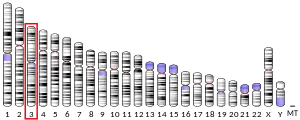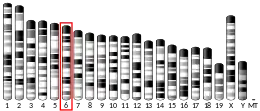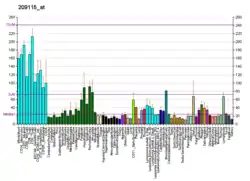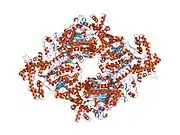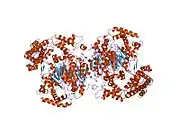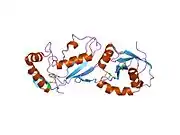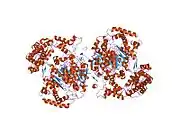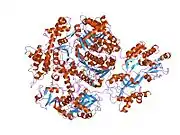UBE1C
NEDD8-activating enzyme E1 catalytic subunit is a protein that in humans is encoded by the UBA3 gene.[5][6]
| UBA3 | |||||||||||||||||||||||||||||||||||||||||||||||||||
|---|---|---|---|---|---|---|---|---|---|---|---|---|---|---|---|---|---|---|---|---|---|---|---|---|---|---|---|---|---|---|---|---|---|---|---|---|---|---|---|---|---|---|---|---|---|---|---|---|---|---|---|
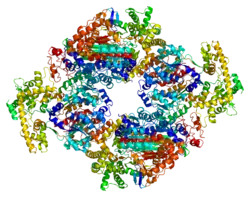 | |||||||||||||||||||||||||||||||||||||||||||||||||||
| |||||||||||||||||||||||||||||||||||||||||||||||||||
| Identifiers | |||||||||||||||||||||||||||||||||||||||||||||||||||
| Aliases | UBA3, NAE2, UBE1C, hubiquitin like modifier activating enzyme 3 | ||||||||||||||||||||||||||||||||||||||||||||||||||
| External IDs | OMIM: 603172 MGI: 1341217 HomoloGene: 2951 GeneCards: UBA3 | ||||||||||||||||||||||||||||||||||||||||||||||||||
| |||||||||||||||||||||||||||||||||||||||||||||||||||
| |||||||||||||||||||||||||||||||||||||||||||||||||||
| |||||||||||||||||||||||||||||||||||||||||||||||||||
| |||||||||||||||||||||||||||||||||||||||||||||||||||
| |||||||||||||||||||||||||||||||||||||||||||||||||||
| Wikidata | |||||||||||||||||||||||||||||||||||||||||||||||||||
| |||||||||||||||||||||||||||||||||||||||||||||||||||
| E2 binding domain | |||||||||
|---|---|---|---|---|---|---|---|---|---|
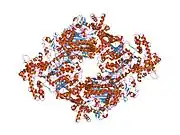 appbp1-uba3-nedd8, an e1-ubiquitin-like protein complex with atp | |||||||||
| Identifiers | |||||||||
| Symbol | E2_bind | ||||||||
| Pfam | PF08825 | ||||||||
| InterPro | IPR014929 | ||||||||
| |||||||||
The modification of proteins with ubiquitin is an important cellular mechanism for targeting abnormal or short-lived proteins for degradation. Ubiquitination involves at least three classes of enzymes: ubiquitin-activating enzymes, or E1s, ubiquitin-conjugating enzymes, or E2s, and ubiquitin-protein ligases, or E3s. This gene encodes a member of the E1 ubiquitin-activating enzyme family. The encoded enzyme associates with AppBp1, an amyloid beta precursor protein binding protein, to form a heterodimer, and then the enzyme complex activates NEDD8, a ubiquitin-like protein, which regulates cell division, signaling and embryogenesis. Multiple alternatively spliced transcript variants encoding distinct isoforms have been found for this gene.[6]
This enzyme contains an E2 binding domain, which resembles ubiquitin, and recruits the catalytic core of the E2 enzyme UBE2M (Ubc12) in a similar manner to that in which ubiquitin interacts with ubiquitin binding domains.[7]
References
- GRCh38: Ensembl release 89: ENSG00000144744 - Ensembl, May 2017
- GRCm38: Ensembl release 89: ENSMUSG00000030061 - Ensembl, May 2017
- "Human PubMed Reference:". National Center for Biotechnology Information, U.S. National Library of Medicine.
- "Mouse PubMed Reference:". National Center for Biotechnology Information, U.S. National Library of Medicine.
- Osaka F, Kawasaki H, Aida N, Saeki M, Chiba T, Kawashima S, Tanaka K, Kato S (August 1998). "A new NEDD8-ligating system for cullin-4A". Genes Dev. 12 (15): 2263–8. doi:10.1101/gad.12.15.2263. PMC 317039. PMID 9694792.
- "Entrez Gene: UBE1C ubiquitin-activating enzyme E1C (UBA3 homolog, yeast)".
- Huang DT, Paydar A, Zhuang M, Waddell MB, Holton JM, Schulman BA (February 2005). "Structural basis for recruitment of Ubc12 by an E2 binding domain in NEDD8's E1". Mol. Cell. 17 (3): 341–50. doi:10.1016/j.molcel.2004.12.020. PMID 15694336.
- Gong, L; Yeh E T (April 1999). "Identification of the activating and conjugating enzymes of the NEDD8 conjugation pathway". J. Biol. Chem. UNITED STATES. 274 (17): 12036–42. doi:10.1074/jbc.274.17.12036. ISSN 0021-9258. PMID 10207026.
- Chen, Y; McPhie D L; Hirschberg J; Neve R L (March 2000). "The amyloid precursor protein-binding protein APP-BP1 drives the cell cycle through the S-M checkpoint and causes apoptosis in neurons". J. Biol. Chem. UNITED STATES. 275 (12): 8929–35. doi:10.1074/jbc.275.12.8929. ISSN 0021-9258. PMID 10722740.
Further reading
- Gong L, Yeh ET (1999). "Identification of the activating and conjugating enzymes of the NEDD8 conjugation pathway". J. Biol. Chem. 274 (17): 12036–42. doi:10.1074/jbc.274.17.12036. PMID 10207026.
- Gubin AN, Njoroge JM, Bouffard GG, Miller JL (1999). "Gene expression in proliferating human erythroid cells". Genomics. 59 (2): 168–77. doi:10.1006/geno.1999.5855. PMID 10409428.
- Chen Y, McPhie DL, Hirschberg J, Neve RL (2000). "The amyloid precursor protein-binding protein APP-BP1 drives the cell cycle through the S-M checkpoint and causes apoptosis in neurons". J. Biol. Chem. 275 (12): 8929–35. doi:10.1074/jbc.275.12.8929. PMID 10722740.
- Hartley JL, Temple GF, Brasch MA (2001). "DNA cloning using in vitro site-specific recombination". Genome Res. 10 (11): 1788–95. doi:10.1101/gr.143000. PMC 310948. PMID 11076863.
- Wiemann S, Weil B, Wellenreuther R, et al. (2001). "Toward a catalog of human genes and proteins: sequencing and analysis of 500 novel complete protein coding human cDNAs". Genome Res. 11 (3): 422–35. doi:10.1101/gr.GR1547R. PMC 311072. PMID 11230166.
- Simpson JC, Wellenreuther R, Poustka A, et al. (2001). "Systematic subcellular localization of novel proteins identified by large-scale cDNA sequencing". EMBO Rep. 1 (3): 287–92. doi:10.1093/embo-reports/kvd058. PMC 1083732. PMID 11256614.
- Strausberg RL, Feingold EA, Grouse LH, et al. (2003). "Generation and initial analysis of more than 15,000 full-length human and mouse cDNA sequences". Proc. Natl. Acad. Sci. U.S.A. 99 (26): 16899–903. Bibcode:2002PNAS...9916899M. doi:10.1073/pnas.242603899. PMC 139241. PMID 12477932.
- Walden H, Podgorski MS, Schulman BA (2003). "Insights into the ubiquitin transfer cascade from the structure of the activating enzyme for NEDD8". Nature. 422 (6929): 330–4. Bibcode:2003Natur.422..330W. doi:10.1038/nature01456. PMID 12646924. S2CID 4370095.
- Bohnsack RN, Haas AL (2003). "Conservation in the mechanism of Nedd8 activation by the human AppBp1-Uba3 heterodimer". J. Biol. Chem. 278 (29): 26823–30. doi:10.1074/jbc.M303177200. PMID 12740388.
- Walden H, Podgorski MS, Huang DT, et al. (2004). "The structure of the APPBP1-UBA3-NEDD8-ATP complex reveals the basis for selective ubiquitin-like protein activation by an E1". Mol. Cell. 12 (6): 1427–37. doi:10.1016/S1097-2765(03)00452-0. PMID 14690597.
- Ota T, Suzuki Y, Nishikawa T, et al. (2004). "Complete sequencing and characterization of 21,243 full-length human cDNAs". Nat. Genet. 36 (1): 40–5. doi:10.1038/ng1285. PMID 14702039.
- Huang DT, Miller DW, Mathew R, et al. (2004). "A unique E1-E2 interaction required for optimal conjugation of the ubiquitin-like protein NEDD8". Nat. Struct. Mol. Biol. 11 (10): 927–35. doi:10.1038/nsmb826. PMC 2862556. PMID 15361859.
- Gerhard DS, Wagner L, Feingold EA, et al. (2004). "The status, quality, and expansion of the NIH full-length cDNA project: the Mammalian Gene Collection (MGC)". Genome Res. 14 (10B): 2121–7. doi:10.1101/gr.2596504. PMC 528928. PMID 15489334.
- Wiemann S, Arlt D, Huber W, et al. (2004). "From ORFeome to biology: a functional genomics pipeline". Genome Res. 14 (10B): 2136–44. doi:10.1101/gr.2576704. PMC 528930. PMID 15489336.
- Huang DT, Paydar A, Zhuang M, et al. (2005). "Structural basis for recruitment of Ubc12 by an E2 binding domain in NEDD8's E1". Mol. Cell. 17 (3): 341–50. doi:10.1016/j.molcel.2004.12.020. PMID 15694336.
- Mehrle A, Rosenfelder H, Schupp I, et al. (2006). "The LIFEdb database in 2006". Nucleic Acids Res. 34 (Database issue): D415–8. doi:10.1093/nar/gkj139. PMC 1347501. PMID 16381901.
- Hiller M, Huse K, Szafranski K, et al. (2007). "Single-nucleotide polymorphisms in NAGNAG acceptors are highly predictive for variations of alternative splicing". Am. J. Hum. Genet. 78 (2): 291–302. doi:10.1086/500151. PMC 1380236. PMID 16400609.
- Norman JA, Shiekhattar R (2006). "Analysis of Nedd8-associated polypeptides: a model for deciphering the pathway for ubiquitin-like modifications". Biochemistry. 45 (9): 3014–9. doi:10.1021/bi052435a. PMID 16503656.
- Li T, Santockyte R, Shen RF, et al. (2006). "A general approach for investigating enzymatic pathways and substrates for ubiquitin-like modifiers". Arch. Biochem. Biophys. 453 (1): 70–4. doi:10.1016/j.abb.2006.03.002. PMID 16620772.
External links
- PDBe-KB provides an overview of all the structure information available in the PDB for Human NEDD8-activating enzyme E1 catalytic subunit (UBE1C)
